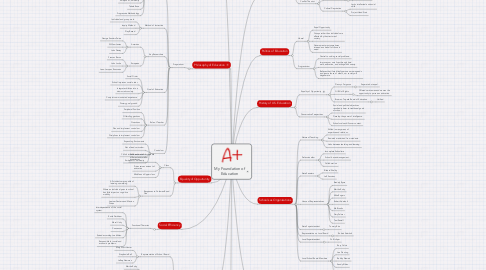
1. Social Efficiency
1.1. Functional Therories
1.1.1. Interdependence of the social system.
1.1.2. Emile Durkhem
1.1.3. Moral Unity
1.1.4. Consensus
1.1.5. Sorted according to abilities.
1.1.6. Responsible for social and economic problems.
2. Philosophy of Education
2.1. Pragmatism
2.1.1. Generic Notions
2.1.1.1. Action oriented, experientially grounded, and poses questions.
2.1.1.2. Emphasis on environment and experiences.
2.1.1.3. Encourages people to find processes that work in order to achieve their desired ends.
2.1.1.4. Embryonic Community
2.1.1.5. Tabula Rosa
2.1.1.6. Progressive Methodology
2.1.2. Method of Instruction
2.1.2.1. Individual and group work.
2.1.2.2. Inquiry Method
2.1.2.3. Play Based
2.1.3. Key Researchers
2.1.3.1. American
2.1.3.1.1. George Sanders Peirce
2.1.3.1.2. William James
2.1.3.1.3. John Dewey
2.1.3.2. European
2.1.3.2.1. Frances Bacon
2.1.3.2.2. John Locke
2.1.3.2.3. Jean-Jacques Rousseau
2.1.4. Goal of Education
2.1.4.1. Social Order
2.1.4.2. School improves social order.
2.1.4.3. Integrate children into a democratic society.
2.1.4.4. Conjoint communicated experience.
2.1.4.5. Primary goal growth.
2.1.5. Role of Teacher
2.1.5.1. Peripheral Position
2.1.5.2. Offers Suggestions
2.1.5.3. Questions
2.1.5.4. Plan and implement curriculum.
2.1.5.5. Disciplines to implement curriculum.
2.1.6. Curriculum
2.1.6.1. Expanding Enviroments
2.1.6.2. Not a fixed curriculum.
2.1.6.3. Child's interest and needs.
2.1.6.4. Embryonic Community
3. Sociological Perspectives
3.1. Topic #1
3.2. Topic #2
3.3. Topic #3
4. Curriculum and Pedagogy
4.1. Representative of School Board
4.1.1. Mary Scott Hunter
4.1.2. Stephanie Bell
4.1.3. Jeffery Newman
4.2. House of Representatives
4.2.1. Martha Roby
4.2.2. Mike Rogers
4.2.3. Terri A. Sewell
4.3. State Senators
4.3.1. Jeff Sessions
4.4. School Board
4.4.1. Robert J. Bentley
4.4.2. Ella B. Bell
4.4.3. Al Thompson
4.4.4. Cynthia Sanders Mccarty
4.5. State Superintendent
4.5.1. Tommy Bice
4.6. Local Superintendent
4.6.1. Thomas R. Bice
5. Equality of Oppurtunity
5.1. Class
5.1.1. Different social classes have different educational experiences
5.1.2. Prices verses amount of education
5.1.3. Middle and Upper class
5.2. Responses to Coleman:Roud One
5.2.1. All students are capable of learning something
5.2.2. Where an individual goes to school has little impact on cognitive mobility
5.2.3. Learner Centers and Mission Driven
6. Sociology of Education
6.1. Functional Theories
6.1.1. Knowledge and Attitudes
6.1.1.1. Differences between schools
6.1.1.2. Private verses Public Schools
6.1.1.3. Summer School
6.1.2. Teacher Behavior
6.1.2.1. Role Strain
6.1.2.2. Role Models
6.1.2.3. Dedicated and Inspirational
7. History of U.S. Education
7.1. Equality of Opportunity
7.1.1. Plessy v. Ferguson
7.1.1.1. Separate but equal.
7.1.2. GI Bill of Rights
7.1.2.1. Offered servicemen and women the opportunity to pursue an education.
7.1.3. Brown v. Topeka Board of Education
7.1.3.1. Unified
7.2. Conservative Perspectives
7.2.1. Social and political objectives resulted in harm to traditional goals of school.
7.2.2. Develop the power of intelligence.
7.2.3. Schools value skills over content.
8. Politics of Education
8.1. Liberal
8.1.1. Equal Opportunity
8.1.2. Groups rather than individuals are affected by the structure of society.
8.1.3. Government must sometimes intercede on behalf of those in need.
8.2. Progressivism
8.2.1. Central to solving social problems.
8.2.2. Improve your own lives through hard work, education, and acting with honesty.
8.2.3. Believes that if we blindly pursue our own needs and ignore those of others, our society will degenerate.
9. Schools as Organizations
9.1. Nature of Teaching
9.1.1. Skilled in many areas of expertise and relations.
9.1.2. Rewards are derived from students.
9.1.3. Links between teaching and learning.
9.2. Professionalism
9.2.1. Incomplete Subculture
9.2.2. School based management.
9.2.3. Collaboration
9.3. State Senators
9.3.1. Richard Shelby
9.3.2. Jeff Sessions
9.4. House of Representatives
9.4.1. Bradely Byme
9.4.2. Martha Roby
9.4.3. Mike Rogers
9.4.4. Robert Aderholt
9.4.5. Mo Brooks
9.4.6. Gary Palmer
9.4.7. Terri Sewell
9.5. State Superintendent
9.5.1. Tommy Bice
9.6. Representative on Local Board
9.6.1. Robert Aderholt
9.7. Local Superintendent
9.7.1. Dr. Ric Ayer
9.8. Local School Board Members
9.8.1. Rory Colvin
9.8.2. Lee Fleming
9.8.3. Bobby Stewart
9.8.4. Sandy Elkins
9.8.5. Mike Price
10. Educational Inequality
10.1. Fiunctionalist
10.1.1. Genetic Differences
10.1.1.1. Environmental and Social Factors
10.1.2. Student-Centered Explanations
10.1.2.1. Inferior Schools
10.2. Conflict Theorist
10.2.1. School Financing
10.2.1.1. Affluent and Poor Districts
10.2.2. Gender and Schooling
10.2.2.1. Feminist Movement
10.2.3. Cultural Deprivation
10.2.3.1. Lacks intellectual and social skills
10.2.3.2. Project Head Start
11. Educational Reform and School Improvement
11.1. School-Based Reforms
11.1.1. Charter Schools
11.1.2. Vouchers
11.1.3. Favor private schools
11.1.4. Magnet Schools
11.1.5. Intersectional Choice Plans
11.1.6. Intradistrict school pans
